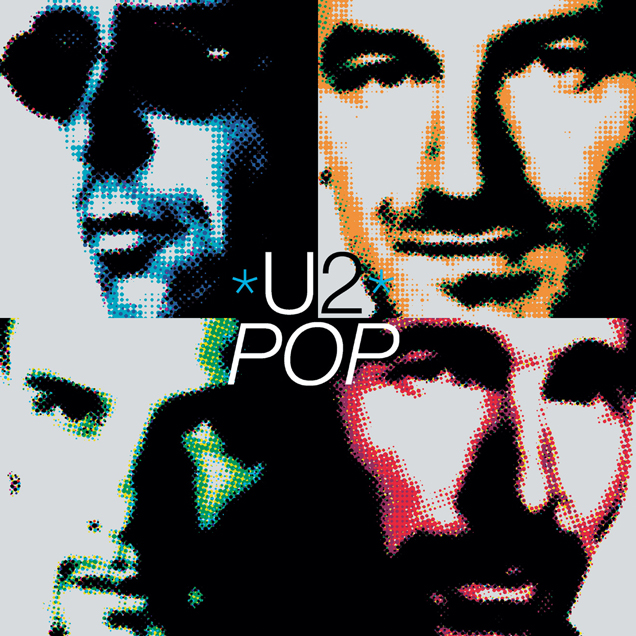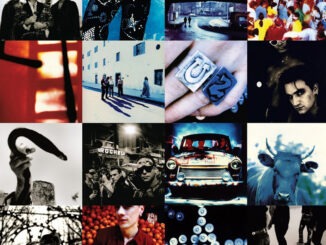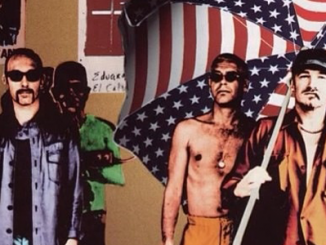
In March of 1997, 26 years ago, U2 released their much anticipated ninth studio album POP; for fans and critics alike, it quickly became their most polarizing release. There is a prevailing feeling that POP has become the orphan child in U2’s discography. The band seems to have all but abandoned playing songs from the album in concert. It has become an album that dares not speak its name in many ways. I have never understood the album’s negative feelings. I find the equal of many of the band’s prior works artistically and not as it is commonly characterized as a career misstep.
The band has often said the release was rushed and needed more time. Looking back, it is easy to see that circumstances surrounding the creation of POP were stressful and somewhat counterproductive, but that does not entirely explain why many critics and fans dismissed the album. It seems a good time to reexamine this woefully under-appreciated recording.
POP was U2’s most experimental effort but was not unique in the context of what was populating the charts at the time; electronic, dance and techno were rife. Why is it that a record that stretched just beyond the reach of Zooropa’s experimentation would create such a backlash? Why in the same year could bands like The Prodigy and Radiohead put out albums that shared many of the same musical or thematic elements as POP, end up being heralded and feted, while POP was left out in the cold?
Some suggest in retrospect that POP was too complicated and dark for vast public consumption. Or was it possible that U2 has gone beyond the boundaries their fans would allow them to go; A case of this far but no farther? Since its release, it has been accepted as common knowledge that Rock and Roll’s most astute operators had stumbled on POP. Many a rock group would love to have such a career slip with 6 million copies sold, yet POP is considered a flop; it boggles the mind.
Any re-examination of POP requires a look at the surrounding history and specifics of the album. POP was the third leg of the musical trilogy that started with Achtung Baby through Zooropa and finished with POP. Throughout the ’90s, U2 had been one of the few remaining 80’s heavy hitter bands that had not imploded. They had successfully changed with the times, transforming their projected image and music. On Achtung Baby, their most successful outing, they began the process of welding pop, alternative, techno, dance and electronica together.
Zooropa would continue that transformation, adding a euro-centred ennui to the mix and even more glitchy goodness to their already successful sound. It followed that on paper, POP should have been the triumphant culmination of all these genres’ marriage. The band would go farther out on a limb on the release, adding sampling, loops, programmed drum machines, and sequencing. The band indeed had come a long way from producer Steve Lillywhite playing the glockenspiel to fill out the sound of October.
The album started in late 1995 with various producers and boiled down to Nellie Hooper, Flood, Howie B and Steve Osborne; missing were the stalwart Brian Eno and Daniel Lanois. The band entered the Hanover Quay studio trying for inspiration and improvisation with a no holds barred attitude. There was very little material written before entering the studio, very much like Achtung Baby. Quickly what started as a fun, relaxed project ended up with a stressed-laden deadline looming agony. It became clear in Nov 1995 that Larry, after his surgery was not ready to reenter the studio as he was in excruciating pain when behind the drums, so he returned to P/T rehab, and the remaining band members soldiered on.
The whole band reconvened in Feb of 1996, and Flood, Howie B and Hooper attempted to rework the material they had. They ran into a snag when Mullen had to re-record drum parts to replace loops Howie B had sampled without permission, chewing up more precious time that, in hindsight, the band didn’t have to burn.
In the meantime, U2 had mistakenly given their manager Paul McGuinness the okay to book the tour, and now the album was anything but ready. The band was struggling and, if not panicked, rightfully concerned as they were now under the deadline of having the album finished in time for the 1997 POP Mart tour. The release date was moved from December of 96 to March of 97. U2 ran out of time, and the final product has never really been to their liking.
So much so that they have re-recorded and remixed many of the songs after the fact. The resulting release led The Edge to describe POP as a compromised project, and Mullen stated that it would have been an entirely different record for two to three more months. In contrast, Paul McGuinness said that POP was a situation of “Too many cooks in the kitchen.” Historically POP did not fare as well as their prior releases in the ’90s. It reached #1 in 35 countries, including the UK and the US, but its lifetime sales are the lowest in U2’s catalogue. Of POP’s six singles releases, three songs would not crack the top 40, something unheard of in U2’s recent past.
Hindsight being 20/20, it is easy to identify any underlying issues for the band in and out of the studio around the time of POP’s creation. One crucial factor was the lack of Larry Mullen’s input on the initial sessions. Larry has never been one to laud experimentation for its own sake and always served as the brakes when other band members strayed too far down the path to outright musical oblivion. He served as the sceptical and practical consultant with an impeccable ear for what worked. Early in POP’s incubation, Mullen was sidelined and not fully able to participate in initial recording sessions due to back surgery and P/T rehab. The lack of Mullen’s advice and consent early in the process was a portent to other problems.
Bono’s possible career-ending vocal issues were even more threatening than Mullen’s bad back. These physical problems took longer to overcome than anyone expected and significantly ate into creative studio time. Another underlying issue was the band was exhausted from being rock culture trailblazers; they were still burnt out and distracted a year or two after the Zoo TV Tour. The distractions of real life were rife for the band members. Bono came off the Zoo TV Tour and had no routine to his daily life and had to piece his everyday life back together. Larry had started a family and was confronting his lingering back problems, Edge was at the beginning of starting a new family, and Adam was working on his sobriety and musical skills. In late 1995 the band had not completely recovered from their road weariness and the personal issues lurking underneath the surface manifesting themselves on POP.
When you talk to younger fans of U2, they tend to like POP and question why it is considered sub-par. Many older fans, in general, dislike the release. It is a strange dichotomy. If POP is listened to in the context of the immediate prior releases, Achtung Baby comes off as the initial revamp after The Joshua Tree trilogy. Zooropa further subverts what people had come to expect from the band, and it all but tee up POP, which is despairing, vulgar at times, complicated and weary, but also stunningly groundbreaking for U2’s sound. The release attempted to legitimize all those underground genres buzzing around while still being a popular hit. That was a laudable goal. However, the real problem was that beneath all the glitz and head-faking experimentation, the album touches on themes few ever discuss out loud and even less on a rock recording. Found here is a relentless collection of the loudest, angriest, strangest songs U2 has up to now released. Unlike The Joshua Tree, where Exit was scary and angry but surrounded by comfortable songs, POP continually bludgeons the listener with weighty thoughts and emotions. In the songs, you find ennui, uncertainty and world-weariness.
Bono questions if God is listening, just as David did in the Old Testament. Fans had become accustomed to Bono taking on larger themes, but never with the irony, hopelessness, and doubt of POP. The band had travelled to the end of all things, and the message was not the hopeful one the band has triumphantly espoused in prior recordings. The hangover after Zoo TV was apparent and not what the public wanted. The masses did not understand the irony-laden songs. The picture painted by the lyrics in the album mirrored society’s every flaw. Some believe the album was documentation of Bono’s loss of faith. Added all together, the public bolted from the heavy themes more than any experimentation in the music itself. Fans were in no mood to indulge the band in what they saw as part farce and part acidic world-weariness. Bono, revered as a rock god, was displaying his clay feet, and it proved unpopular.
So what is so wrong with POP? My answer is nothing. Let’s for a moment table the past preconceptions of POP and reexamine the content and begin at the beginning. The head-faking Discotheque came throbbing out of the gate, the beginning of the trilogy of songs straight from the disco filled with equal measures of detachment and debauchery. However, if you listen closely to the lyrics, they are actually trying to grasp the riddle of love, both temporal and even spiritual. The song was every indication that U2 picked up where Zooropa left off. The sound was arresting, with the wonky oscillating guitar intro busting into the throaty lyric with the rhythm section taking the song home. The killer Village People homage video confirmed the kitsch of the album’s title; however, serious thoughts loomed under the hedonistic trappings.
The song lyrics searched for the true love promised in every love song ever written. Do You Feel Loved serves up another tremendous trip-hop rhythm with a choppy wah guitar and some of Adam Clayton’s best bass lines. The song can be taken in many ways. If the lyrics are given a straight read, it almost comes off as a prayer and could be the forerunner of Yahweh on How To Dismantle an Atomic Bomb. It can also be taken as an argument between lovers, where the question is, how much is enough for the other to feel the love?
Bono is the funk master but also at his most earnest. The chorus explodes with Edge’s guitar treatment, and whatever Mullen is doing on the song, it just grounds it perfectly, while Clayton thumps away, channelling his inner Bootsy Collins. Enter Mofo, a dance-infused sound fest. I have U2 fan friends of the Christian persuasion who were brought short by this song’s title. They could not get past its connotations. But the song is a head fake and like much of the album. There is the apparent veneer and then a gooey, deeply introspective centre. It is not a song about an offensive swearword but instead weaving many serious themes into a song.
It questions how to be larger than life rockstar and also have devout Christian beliefs,” looking for baby Jesus under the trash”; displays the theme of his pain at losing his mother so young, “Mother you left and made me someone” and finally deals with the challenges of fatherhood, “looking for the father of my two little girls.” The song reveals Bono at his most vulnerable, and if it had been done to an acoustic treatment with a different title would be lauded by many as the album’s One. This song sound-wise is very far away from U2’s classic style, and it is one of the bravest things they have ever released.
After the opening head of, fake disco trilogy, the gears are abruptly shifted sonically if not thematically on If God Would Send His Angels. It is a song that could have come directly off of side two of The Joshua Tree; however, it is much more world-weary than anything on that release. Where The Joshua Tree was triumphant, this song has battered desperation seeping through its pores. Here find an examination of how bad and low things can go; a relationship in tatters, burnt-out individuals in burnt-out neighbourhoods.
The desolation of war and poverty; and the overall question of how could God exist and allow all this agony; “God had his phone off the hook, babe, would he even pick up if he could?” Ironically those believers who were shocked by Mofo should have been more freaked out by the bitterness of this song; “So where is the hope and where is the faith … and the love?” The accompaniment is familiar but stark with the rhythm section in command and then Edge letting loose with a trademark crystalline riff. The outré on the song is spellbinding.
Staring at the Sun was a more fan-friendly selection. The lyrics again undermine the jangly positive feel of the music. Bono is found questioning whether it is wiser to live on the surface, being deaf and dumb but happy instead of looking deeper and possibly being miserable. “…to the ones staring at the sun… afraid of what you’ll find when you take a look inside… not just deaf and dumb… staring at the sun I’m not the only one who’d rather go blind.” Again, there is the question of why evil is allowed if God exists: “Referee won’t blow the whistle, God is good, but will he listen?” The fantastic thing about this song’s sound is that it will be replicated again in its future works.
I always think Last Night On Earth is the companion song to Zooropa’s Lemon. The techno overlay has this spinning sinking feeling that is entrancing. The song builds and expands as it goes along, and the chorus is simply fireworks. The song’s lyrics again can be taken in several ways. Extolling living for the moment, that time flies and should be taken advantage of as much as possible. But it also addresses the cost of living for the moment and the unpleasantness when the bill coming due. “She’s living, living next week now, you know she’s going to pay it back somehow, the future is here, at last, the past is too uncomfortable”.
Gone has always been the high point of the album for me. It was a song where all the parts come together to make a most stellar selection. It is the closest the album gets to U2’s prior anthems. The song portrays a young man on the cusp of fame examining his old life and going all-in on the ride to success. “You change your name, but that’s okay, it’s necessary… and what you leave behind you don’t miss anyway…. I’m already gone felt that way all along Closer to you every day, didn’t want it that much anyway.” The song examines the willingness to sell your soul for fame only to find out the price is way too high. “Then you discover what you thought was freedom is just greed.” The song’s semi-autobiographical narrative put some fans off with its jaded vibe, but it is steeped in experience and true emotion. Bono, with this song, put back on his MacPhisto suit and gave it one more go-round. The drama is palpable and laudably backed up by the strongest music on the album; everyone is firing on all cylinders. Gone should never be off the set list; it is a dramatic, mesmerizing masterwork.
We then encounter the songs that cause the most polarization on the album; Miami, Playboy Mansion and If You Wear That Velvet Dress. A recording layover inspired Miami in the title city. It was yet again another gear shift after the sonic explosion that is Gone. Miami is like some lacerating postcard on the state of America, as it took the country to task for its worship of the plastic world of stardom and fame. The lust for fame is represented by the image of “…Big girl with the sweet tooth watches the skinny girl in the photoshoot.”
The song played on Andy Warhol’s quote that everyone would be famous for 15 minutes in the future. Many fans did not know what to make of the industrial trip-hop beat and the drastic departure from U2’s style with its offhand vocal delivery. To some, it was a glorious mess. To others, it is a song way before its time. Playboy Mansion was the twin to Miami, once again examining America’s obsession with fame and fortune. The throwaway culture personified. It also juxtapositions the Playboy mansion with the gates of heaven.
To enter the Playboy mansion, you only need fame and fortune and a tendency toward debauchery. The song contrasts the Playboy entryway to entering the gates of heaven, where it takes something a bit more demanding in the righteousness department. The song is laden with irony as it discusses “heaven on earth” and tears in heaven. It is a song before its time with the wonky guitar and the slow rhythmic beat conveying all the lyric’s disillusioned ennui, and again it left many fans scratching their heads. Gone is the high point of the recording If You Wear That Velvet Dress is the most achingly beautiful. It is a shimmering song about carnal love. The tempting beautiful moon woos the protagonist. The song is the sexiest song U2 has ever done. The dreamlike vocal is dripped in sensuality as it hypnotizes the listener. Again this song stymied many fans with its sotto voce delivery and the sheer weight of sensuality it expressed. It has always been a favourite of mine on the release.
Please is another song that should be rotating into any set-list when U2 tour. Unfortunately, more than ever, we need to hear the message of this song. Bono’s earnest plea is to look beyond religion to divide people and conquer politically. It called for everyone to look beyond being right at all costs, “…please get up off your knees…please leave me out of this mess… you had to win; you couldn’t just pass.” It is a bitter song about how despicable politicians and religious leaders use faith for their own devices, never really concerned with the ultimate cost as long as their side wins. The stark and punchy accompaniment nails the feeling needed in the song; Mullen’s martial drumming added the powerful punctuation required.
The final song, Wake Up Dead Man, has caused arguments within the U2 fan base for a long time. Many have pointed to the song as Bono’s declaration of his loss of faith. But I would like to suggest instead following King Solomon’s tradition in the book of Ecclesiastes, questioning God’s involvement with a man. The first three lines make for a lyric that has never left me, “Jesus, Jesus, help me. I’m alone in this world, and a fucked up world it is too.” It is a dark night of the soul, where Bono states that whatever you are doing, be it on your own or in front of a crowd, ultimately, it is about you and your maker. The protagonist is at the end of his rope in the song, pleading for a sign. After the Crucifixion, Peter questions his belief as Christ lies in the tomb, and all that seems to be left is defeat. The deadman in question is figuratively Christ and humankind.
The music in the song is also filled with desolation and confusion. An album that began with the throb of disco ends with God’s silence and in between a search to find him in the strangest of places. I have always believed that it is no coincidence that the band begins All That You Can’t Leave Behind with the glorious and triumphant Beautiful Day. Where Wake Up Dead Man is the Crucifixion and its immediate aftermath, Beautiful Day is the Resurrection. The brilliance of juxtapositioning the end of POP with the beginning of All That You Can’t Leave Behind is what will make U2 an enduring exceptional band no matter the roller-coaster of their popularity and sales figures.
POP was the make-it-or-break album to justify U2’s continued musical experimentation while still attempting to sell a boatload of records. As history reveals, it did not work. I find that a shame as I listen to it currently and am amazed at the originality and emotional bravery on display throughout the album. Listening to, in hindsight, it is truly an amazing musical masterwork. POP and its creators owe no apologies to anyone for its existence. There may have been many obstacles and underlying issues, but the release is as good as or better than many things on offer at its creation. U2 would regain phenomenal popularity and sales figures as they returned to their more familiar songwriting and production with the wondrous All That You Can’t Leave Behind. That album would set U2 up for yet another century of stellar work. But POP would mark the last time U2 would be this experimental and risk-taking.
In a way, U2’s stumble with POP passed the trailblazing baton to Radiohead in 1997, and that band would experience their first true breakthrough album that year with OK Computer. It would go on to push the edges of the popular musical envelope. Possibly it took a younger, less established band to be that ironic and convey so much questioning dread. In the end, POP is an under-appreciated gem that deserves more praise and recognition for the masterwork it is, and my fervent wish is that the band would give POP’s stellar tunes another chance to be performed and appreciated.





Be the first to comment